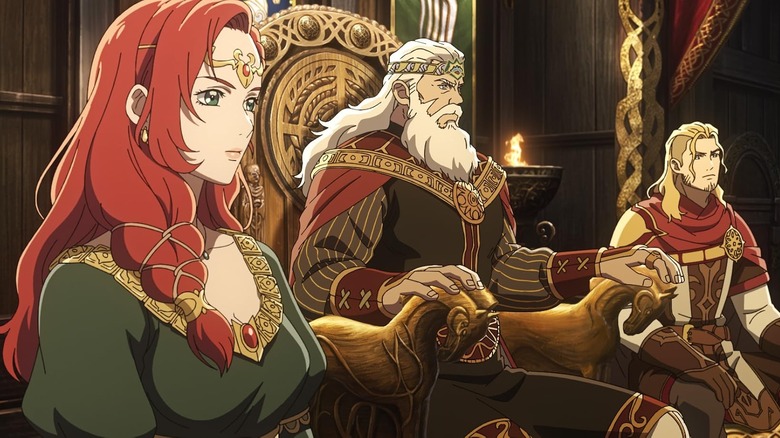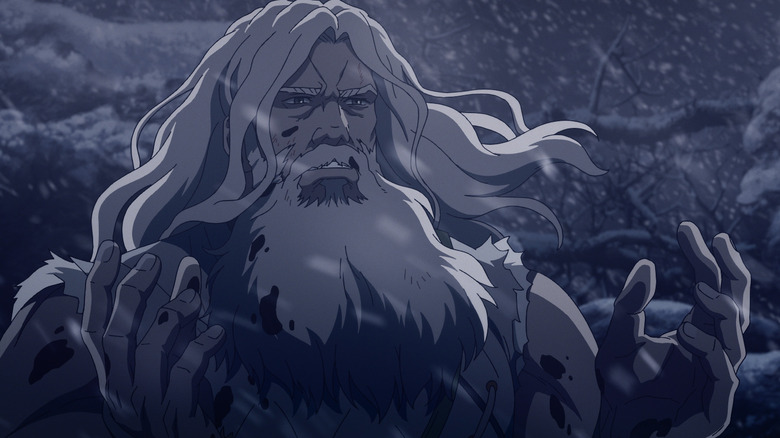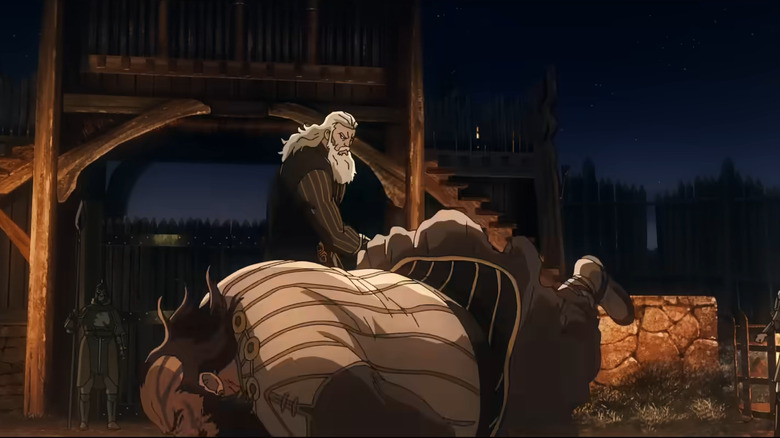The Best Part Of The War Of The Rohirrim Is When A Character Basically Becomes Batman
Three Rings for the Elven-kings under the sky, seven for the Dwarf-lords in their halls of stone, nine for Mortal Men doomed to die, and one spoiler warning for those who haven't watched "The Lord of the Rings: The War of the Rohirrim."
J.R.R. Tolkien's Legendarium is full of cool, larger-than-life characters that achieve mythical status via great feats of strength that defy the gods themselves (like Eärendil, Hurin, and Fingolfin). It's also a world populated by silly little guys like Tom Bombadil.
Most of the biggest, most legendary feats, of course, have been restricted to Tolkien's books so far. That's simply because these acts are so much larger-than-life that they are hard or near-impossible to translate into a TV show or even a movie. How could you properly depict the scale and sheer badassery of Ecthelion slaying Gothmog, the Captain of the Balrogs? Prime Video's "The Rings of Power," for all its flaws, at least promises to deliver some truly mythical events in the history of Middle-earth, including the cataclysmic fate of Númenor.
This is where "The War of the Rohirrim" gets to shine. Granted, our own Jeremy Mathai wasn't so enthused about the animated film in his review and criticized it for feeling less epic and essential than other Tolkien adaptations. Still, there's no denying that animation as a medium has always been perfectly suited to bring fantastical and impossible imagery to the screen much more easily than live-action does.
Case in point, only an animated project like "The War of the Rohirrim" — specifically one made by anime studios already used to crafting unbelievable, physics-defying visuals — could do justice by one of the coolest characters Tolkien ever wrote: Helm Hammerhand.
Helm Hammerhand haunts his enemies like the Ghost of Tsushima (or the Ghost of the Hornburg)
The best part of the movie comes after the Rohirrim have been pushed back and forced to take refuge in The Hornburg to flee from a Dunlending army led by Wulf. At this time, Helm has lost his two sons and is overwhelmed with grief. Under siege by both an army of wildmen and a bitter winter, Helm overcomes his injuries and uses the secret passageways of the fortress to sneak out and straight-up decimate the enemy army one man at a time in the most gruesome ways. That's right, Helm essentially becomes Batman.
We hear about this though the narration delivered by Miranda Otto's Éowyn, as though it were a ghost tale being told around the campfire, revealing how the Dunlendings started spreading rumors of a ghost, a spectral being, a wraith. The stories claimed that he would come out in the middle of the night, clad in white and stalking his prey as if he were a Snow-troll while also having the strength of one. The Dunlending army quickly lost all morale and began to soil themselves (figuratively, but also wouldn't be surprising if they had literally) at the mere thought of the ghost of Helm Hammerhand killing them with his bare hands. It's funny that they specifically refer to Helm as a Wraith, just like the Nazgûl, given the character was reimagined as one of the Ringwraiths in the game "Middle-earth: Shadow of War."
Helm was no wraith, of course, but simply embraced his inner Batman and began spreading fear in the minds of his enemies, becoming a mythical figure in their minds. They even came to believe he was eating the corpses of the men he slayed. It's a fantastic bit of adaptation from what's otherwise a very brief description in the film's Tolkien-penned source material:
"The dread of him alone was worth many men in the defence of the Burg. He would go out by himself, clad in white, and stalk like a snow-troll into the camps of his enemies, and slay many men with his hands. It was believed that if he bore no weapon no weapon would bite on him."
Helm Hammerhand has the strength of an anime protagonist
It's a fantastic moment, but it's also thanks to the film's animation that Helm Hammerhand goes from being a guy with some creative ideas for scaring his enemy to a larger-than-life titan with the strength of a god.
We get our first glimpse of Helm's prowess (and why he's called Hammerhand) near the start of "The War of the Rohirrim" when he fights Freca, a Dunlending lord, and kills him with a single punch. In Tolkien's source material, Freca succumbs to his injuries after a short while, but here it happens instantly, as though Helm was All Might or some other ultra-powerful anime character with incredible, superhuman strength. It's the most anime thing in the movie, and it works precisely because it's an anime feature. In live-action, it would either look ridiculous or fail to leave much of an impact. Here, however, Helm is allowed to literally look and act like the legend that's being spread about him.
During his winter crusade, Helm squares off against two orcs and a troll, killing the former with ease and breaking the horn off the latter with just one blow. Through animation, even the size scaling changes with nearly every scene. At some points, especially in his last stand, Helm looks over seven feet tall, towering over the Dunlendings he destroys with his hands.
Ultimately, all of this helps to turn the character into an epic hero of legend and justify this story being told. In Tolkien's books, there's nothing particularly special about the character beyond him being one of many heroes of old who has some big fortress or monument named after them. What's more, Helm's heroic exploits as recounted by Tolkien are likely heavily exaggerated, as much of his writing is meant to evoke the tradition of oral history and legends of the British Isles' history. In "The War of the Rohirrim," thanks to the power of animation, we see Helm as the Batman-esque legend he is believed to be, and he rules.
"The Lord of the Rings: The War of the Rohirrim" is now playing in theaters.


